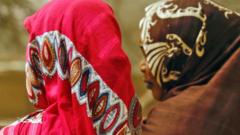The Zamzam camp near el-Fasher, home to hundreds of thousands of displaced individuals fleeing Sudan's ongoing civil war, is grappling with catastrophic conditions following three consecutive days of brutal attacks. Amid grave fears and uncertainty, one camp resident described the precarious situation as "extremely catastrophic," while another labeled the circumstances as "dire." As reported by the United Nations, these assaults have resulted in over 100 civilian casualties—including at least 20 children and a medical team—in the western Darfur region.
The violence, attributed to the paramilitary group Rapid Support Forces (RSF), has seen the camps Zamzam and Abu Shouk become temporary shelters for more than 700,000 residents, many of whom are enduring famine-like conditions. The UN’s humanitarian coordinator in Sudan, Clementine Nkweta-Salami, expressed her outrage at these attacks, highlighting them as an unacceptable escalation of violence against displaced populations and aid workers.
Relief International, an aid organization, reported that nine of its staff members, including healthcare professionals, were tragically killed during the assaults, calling the actions against the health infrastructure a targeted attack to obstruct access to vital medical services for displaced individuals. In stark contrast, the RSF denied accountability for the violence, arguing that reports of the assaults were fabricated to tarnish their image.
One resident, Mustafa, who operates a community kitchen within the camp, shared heartbreaking news that many of his peers, along with family members, had lost their lives. As the shelling persists, he described a climate of despair where medical assistance is virtually non-existent, leading to preventable deaths. Another resident echoed similar sentiments, mentioning how families are virtually trapped, with all escape routes blocked.
Recent assessments from Yale University noted that the attacks on Zamzam represent a severe escalation in conflict since the outbreak of fighting in El-Fasher, indicating significant destruction from arson and shelling within the camp's infrastructure. This devastating civil war, ignited by a power struggle between the army and RSF leaders, has ultimately led to the world's largest humanitarian crisis, displacing over 12 million people and exacerbating hunger across the region.
As the RSF continues its siege of el-Fasher, both frontline residents and humanitarian organizations grapple with severe consequences, marking yet another chapter in Sudan's tumultuous saga.
The violence, attributed to the paramilitary group Rapid Support Forces (RSF), has seen the camps Zamzam and Abu Shouk become temporary shelters for more than 700,000 residents, many of whom are enduring famine-like conditions. The UN’s humanitarian coordinator in Sudan, Clementine Nkweta-Salami, expressed her outrage at these attacks, highlighting them as an unacceptable escalation of violence against displaced populations and aid workers.
Relief International, an aid organization, reported that nine of its staff members, including healthcare professionals, were tragically killed during the assaults, calling the actions against the health infrastructure a targeted attack to obstruct access to vital medical services for displaced individuals. In stark contrast, the RSF denied accountability for the violence, arguing that reports of the assaults were fabricated to tarnish their image.
One resident, Mustafa, who operates a community kitchen within the camp, shared heartbreaking news that many of his peers, along with family members, had lost their lives. As the shelling persists, he described a climate of despair where medical assistance is virtually non-existent, leading to preventable deaths. Another resident echoed similar sentiments, mentioning how families are virtually trapped, with all escape routes blocked.
Recent assessments from Yale University noted that the attacks on Zamzam represent a severe escalation in conflict since the outbreak of fighting in El-Fasher, indicating significant destruction from arson and shelling within the camp's infrastructure. This devastating civil war, ignited by a power struggle between the army and RSF leaders, has ultimately led to the world's largest humanitarian crisis, displacing over 12 million people and exacerbating hunger across the region.
As the RSF continues its siege of el-Fasher, both frontline residents and humanitarian organizations grapple with severe consequences, marking yet another chapter in Sudan's tumultuous saga.

















